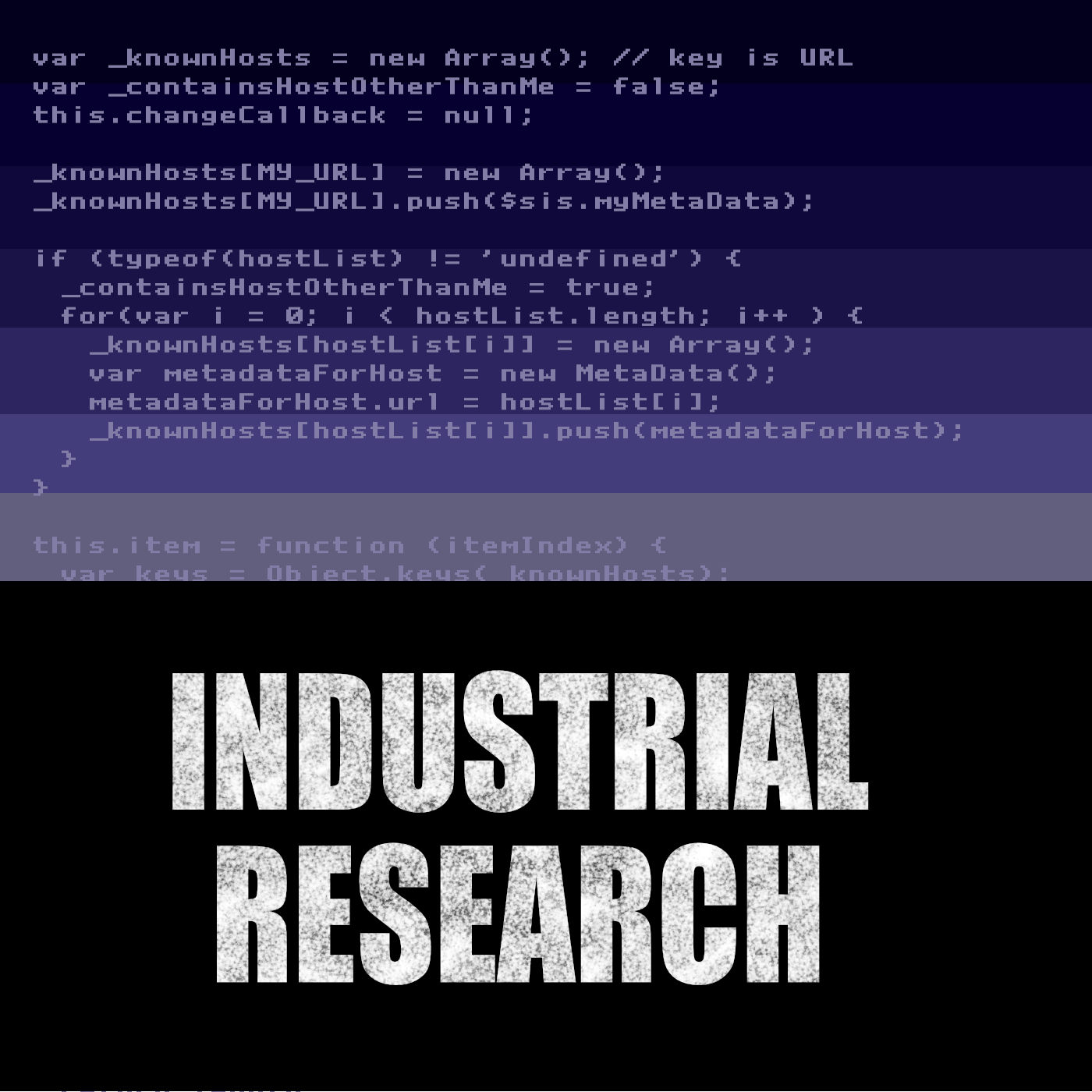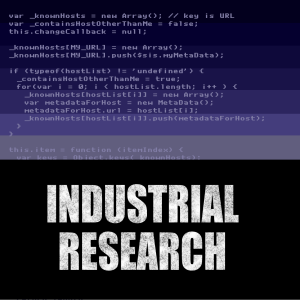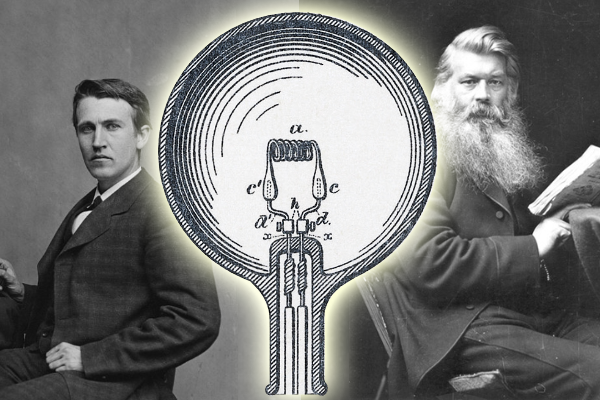
563
Downloads
8
Episodes
The Industrial Research Podcast explores the tips, tricks and techniques used by software industry researchers to attempt to predict future trends, develop new ideas or concepts and validate them. This Podcast is aimed at fellow Industrial Researchers, anyone involved in corporate strategy or entrepreneurs who want to explore how technical and competitive landscapes can be understood. This mini-series will cover the basics of Industrial Research and how it differs from academic research, right through to some core techniques which you can take away and apply to a range of research problems.
Episodes

Monday May 18, 2020
Placing Empirical Research into the Roadmap
Monday May 18, 2020
Monday May 18, 2020
The full blog post is available here.
You can reach me via twitter @mcwoods or via LinkedIn
So far, we’ve covered a lot of ground. We’ve introduced the research roadmap process and described the first phase in detail, working out how to create a vision of the future and how global trends can affect and help predict that. In the second phase we showed how these visions of the future can be translated into open questions. We even saw how these open questions resolve themselves into three basic types of problems:
- Problems that are already solved
- Where there are one or more solutions possible
- Where there is no solution at all
In this episode we are going to cover how we structure our empirical research, our experiment designs, to address those cases where there are multiple solutions or the rare instances when there are no solutions at all. Then we are going to show how this all feeds into the research roadmap process.

Friday Apr 17, 2020
Back to the Research Roadmap Process
Friday Apr 17, 2020
Friday Apr 17, 2020
The last three posts focused on predicting the future. That is only one part of The Research Roadmap. It is time to get back to the research and see how predicting the future fits into the Roadmap Process.
You can find a much more detailed, written version of the podcast on my blog here:
Please feel free to reach out to me, you can find me on twitter, or even on linked in!

Sunday Apr 12, 2020
Predicting the Future (Part 3): The Funnel
Sunday Apr 12, 2020
Sunday Apr 12, 2020
The last of 3 parts on predicting the future. We crunch down an entire industry of futurists and their practices into 6 steps, 6 little nuggets of awesomeness. We introduce the 6 step funnel.
A blog post, upon which this article is based is available here:
The show contains a couple of cameos by my two sons, Ben 8 and Matthew 7 - it is Spring Break.

Friday Apr 03, 2020
Predicting the Future (Part 2): Introducing the Futurist
Friday Apr 03, 2020
Friday Apr 03, 2020
In the last episode I covered how future prediction, is, to a degree, possible but I didn’t get the chance to explain how. There is, in fact, a whole industry dedicated to predicting the future. They call themselves “Futurists” or “Futurologists”. In this episode we delve into the Futurology Industry and extract the "Golden Nuggets of Awesomeness" we need. We use these to help us understand trend prediction.
Read all about the episode on the Industrial Research Blog. Including links to the H.G Wells predictions, more background on the Futurologist and links to Rohit's book "Non-Obvious Mega Trends".

Friday Mar 27, 2020
Predicting the Future Part 1
Friday Mar 27, 2020
Friday Mar 27, 2020
Meet 4 people who successfully predicted the future…. In the last episode I outlined the Research Roadmap Process, the first phase of the process is predicting the future. That is a huge task, in fact, some may say it is impossible, particularly in these trying times. As I record this episode most of the world is coping with the spread of the COVID-19 virus. The world today looks very different to what it did just 1 month ago. But predicting the future, at least to some degree does appear to be possible. Let’s find out how together.
Additional Notes available on the official Podcast site:

Thursday Mar 19, 2020
Methods of Research - With help from Edison and Swan
Thursday Mar 19, 2020
Thursday Mar 19, 2020

Structuring your research is hard, working out what you should research, why and how is tough. In this episode I explore research methods, and show how you can structure your research to answer these questions. So, when boss asks “Why have you spent my money on this experiment?” you can answer with confidence.
Along the way we see how Edison structured his research, and how he addressed issues his competitor in England, Swan was suffering with.
To support this episode is long read blog post on my website, complete with a diagram explaining the research roadmap process. Please check this out. The diagram will help.
What methods and processes do you use to structure your research? – Let me know on Twitter @mcwoods.
PS: If you can hear the train the background drop me a line on Twitter @mcwoods and let me know!

Friday Mar 13, 2020
What is Industrial Research?
Friday Mar 13, 2020
Friday Mar 13, 2020
There is a difference between academic and industrial research. It is not the quality of the research, good research shines wherever it is conducted, but it is the research purpose that changes. The change in purpose shapes how companies conduct research and why we in industrial research often focus on different aspects than our academic colleagues. This episode explores that change and shows how it shapes the research conducted in industry and how those research teams are structured.
There are additional details, including important diagrams and further information on this episode's Industrial Research Podcast's blog site. Please check this out for additional information.
Read the rest of this entry »

Wednesday Mar 11, 2020
What is it you do here anyway?
Wednesday Mar 11, 2020
Wednesday Mar 11, 2020
The Industrial Research podcast explores the tips, tricks and techniques used by software industry researchers to attempt to predict future trends, develop new ideas or concepts and validate them.
This podcast and blog series is aimed at fellow Industrial Researchers, anyone involved in corporate strategy or entrepreneurs who want to explore how technical and competitive landscapes can be understood.
This mini-series will cover the basics of Industrial Research and how it differs from academic research, right through to some core techniques which you can take away and apply to a range of research problems.
You can find more content about this episode on the Industrial Research Mini-Series Website.
Read the rest of this entry »